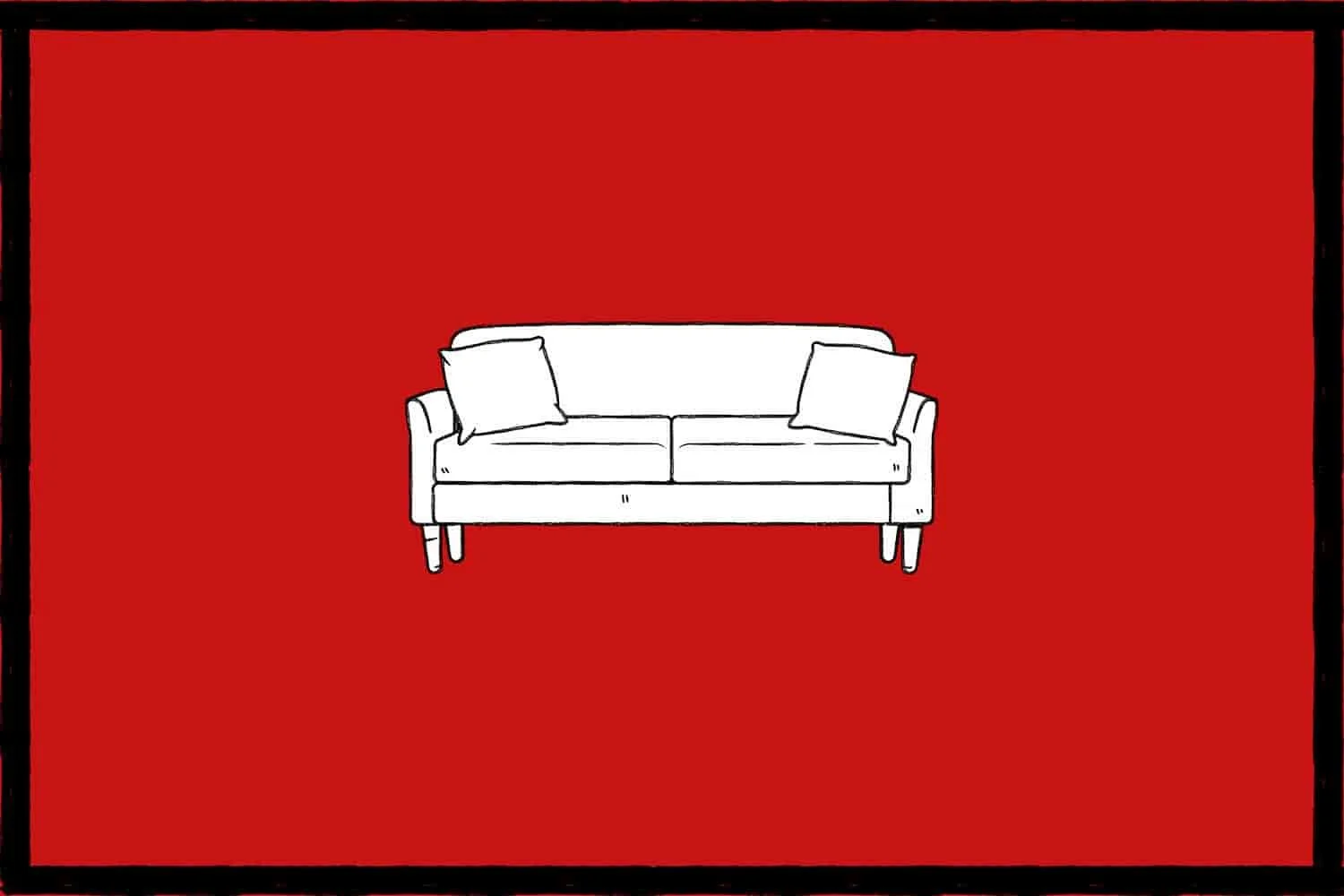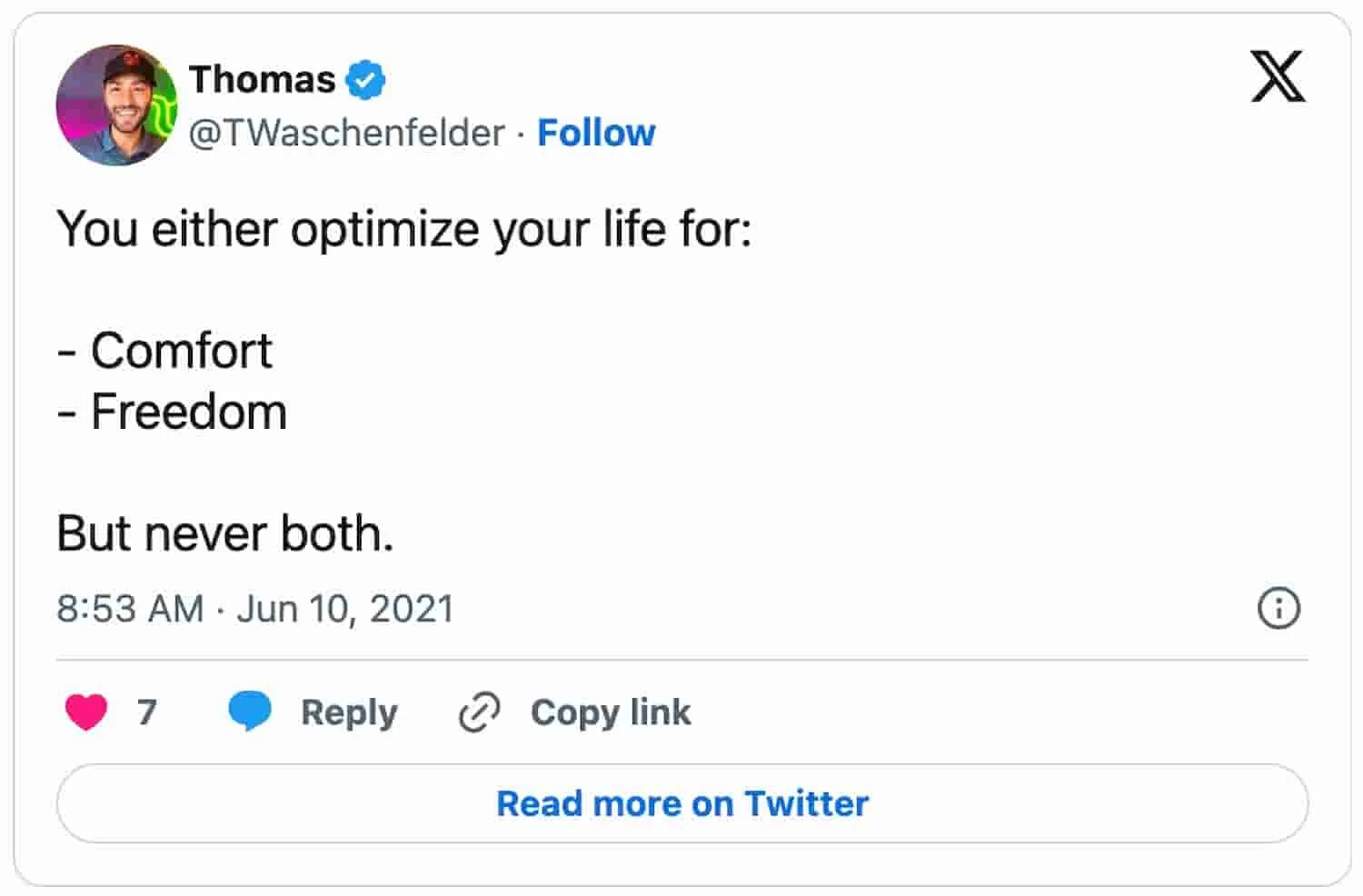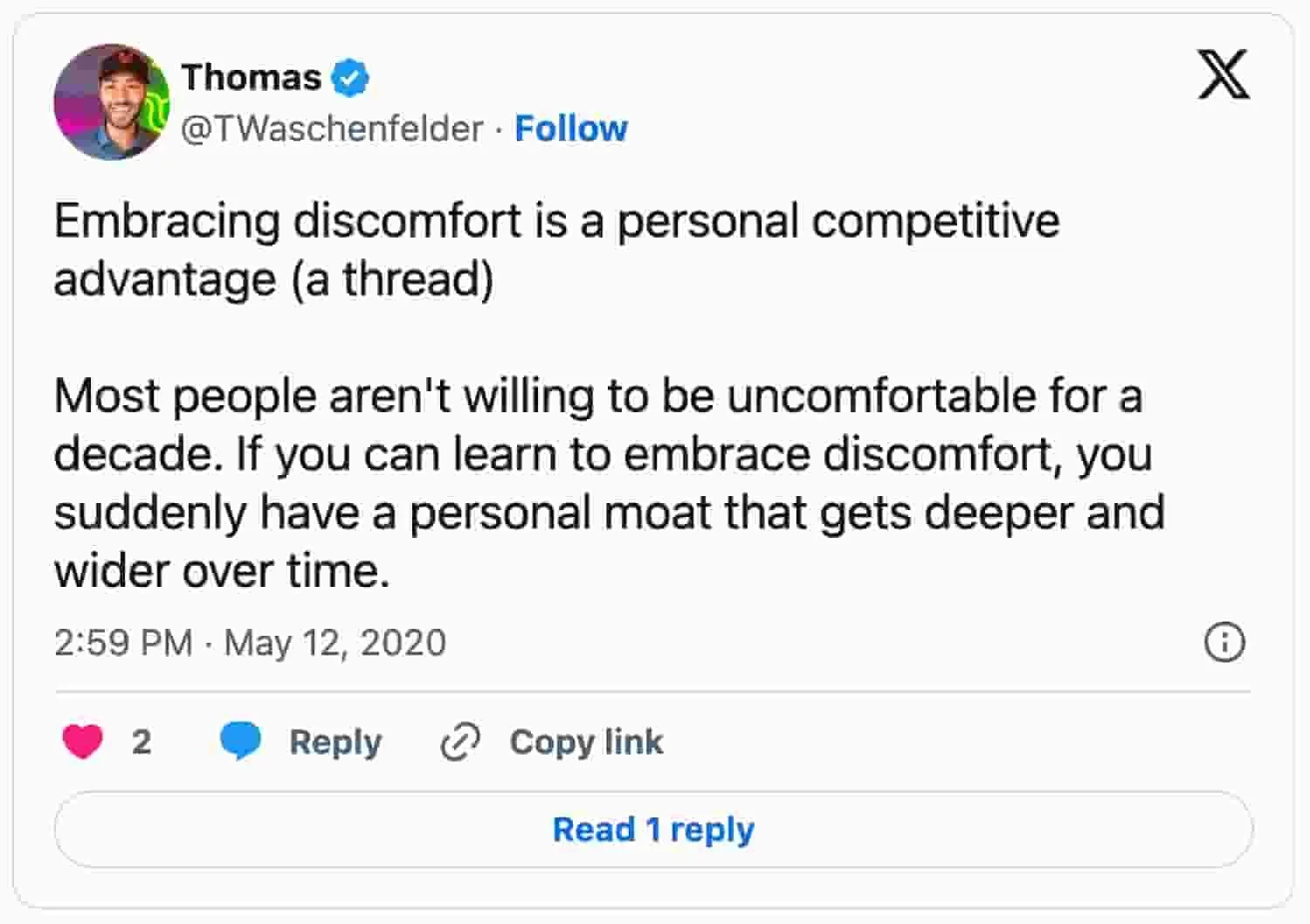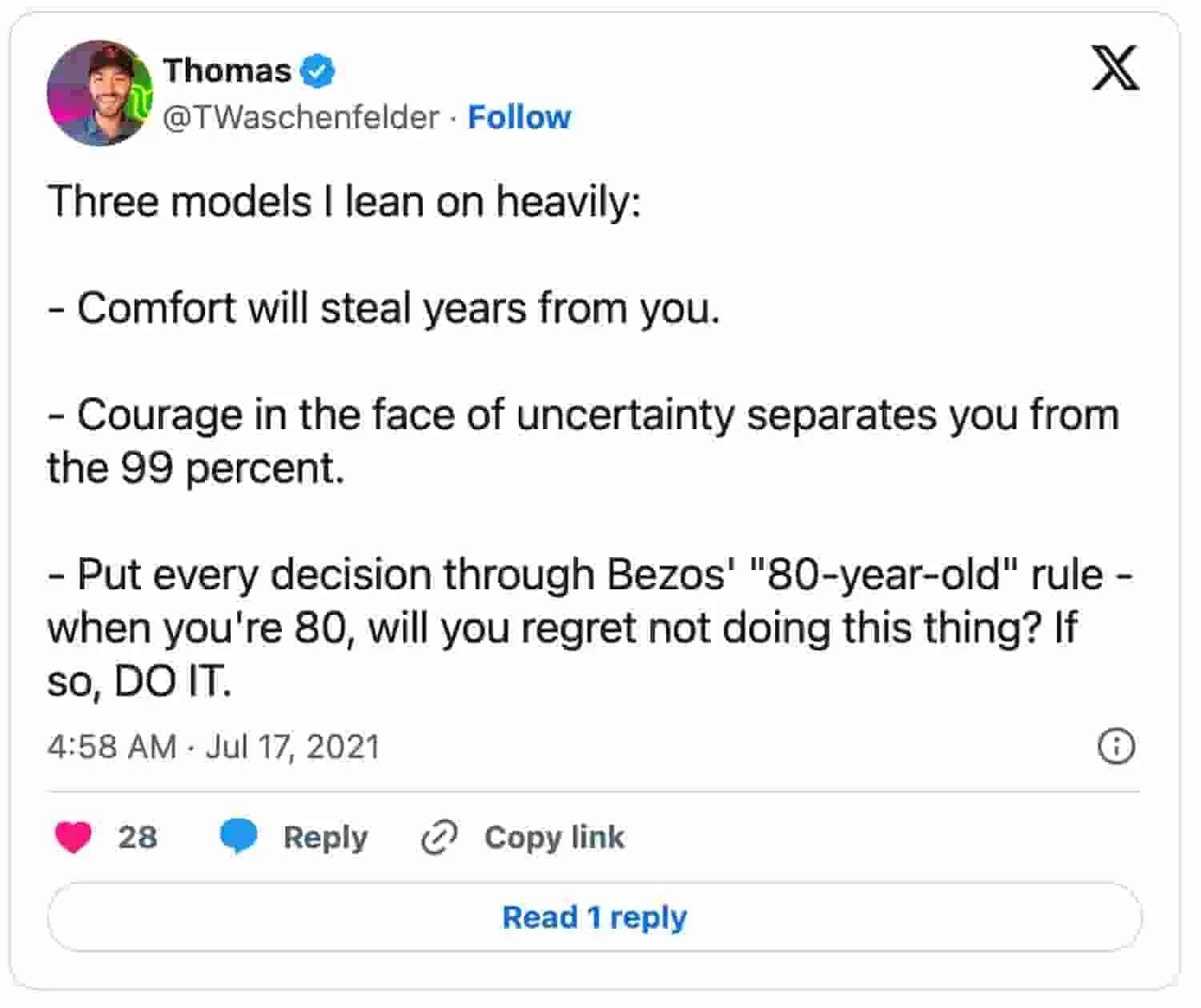Want To Get Rich? Get Uncomfortable
“A person’s success in life can usually be measured by the number of uncomfortable conversations he or she is willing to have.”
To build the life you want, you have to do things you've never done before. The habits that got you here are not going to get you where you want to go. You have to push further.
And there's a simple heuristic you can use to know if you are on the right track to getting rich: you'll feel uncomfortable.
You can either optimize your life for comfort or freedom. But never both.
You’re Probably too comfortable.
Most people never get rich because they’re too comfortable. And comfort is really addicting.
As Nassim Nicholas Taleb writes:
“The three most harmful addictions are heroin, carbohydrates, and a monthly salary.”
A monthly salary destroys your willingness to takes risks because you just don’t need to. No matter how you perform (assuming you’re competent), you get a steady flow of money every other week. And eventually, you’ll be so risk-averse, it’ll be too late to ever get out.
If you’re in this stage - what the late entrepreneur Felix Dennis calls “Slightly Better Off and On the Way Up” - your time is running out quickly. You’re probably on a corporate career track headed for that VP position… and you’re comfortable.
Here’s the advice Dennis gives to people at this crossroads, from in his book, How To Get Rich:
“For the Slightly Better Off and On the Way Up, now is the time to consider whether or not you intend to continue making me (and people like me) even richer, or whether you wish to become rich yourself. You have little time left in which to make up your mind. Your youth and stamina are ebbing away. You are getting too comfortable.”
The window to capture the energy, stamina, determination, and sheer “fuck the world, I'm doing this my way” attitude of youth closes quickly. That’s the mindset necessary for wealth creation - not risk aversion.
Throughout all of my 20s, I was comfortable. I had a full-time job for almost the entire decade once I was out of university. This is a blessing in many ways. I've never been without food or shelter. I've always been able to make rent and save a little money on the side.
But I've been comfortable. I've been addicted. And it wasn’t until I was at this “now or never” crossroads that I quit my full-time job to try something else. If you want to build wealth before your mid-60s, you have to leave it all behind.
To get rich, you must be uncomfortable for years.
People who get really rich often struggle for a long, long time to get their payday.
While there’s a gloss that covers places like Hollywood and Silicon Valley - a glitz and glamour that’s portrayed in mainstream media - the truth is, that’s not how it works. The lives of the actors and entrepreneurs who are building in these industries are difficult. They struggle for decades to become an “overnight” success.
Tech entrepreneur Naval Ravikant talks about this in his podcast series, How To Get Rich. Naval writes:
“The way you want to get wealthy is you want to be poor, and working, and working, and working. Ideally, you'll make your money in discrete lumps….Most creative professions…literally lose money for a decade over your life, while you take massive risk, and you bleed, and bleed, and bleed…And then suddenly in year eleven, or year fifteen, you might have one single big payday.”
I've seen this first-hand as a creative professional. If you work freelance or are trying to build your brand as an actor, director, editor, or producer, it's a grind for 5-10 years. Opportunities are there, but the competition is fierce. It's uncomfortable and exhausting.
But when you do hit, the payday can be life-changing. Suddenly, you have more money than you've ever had. That’s how you want to build wealth - one big paycheck at a time.
To rise in life, bleed a little bit each day.
As Naval says above, to get rich with a big payday, you need to withstand losing a little bit each day. Because you have no steady paycheck, you’re spending money without any coming in.
This is hard to do because of the way you are wired to react to a loss. You hurt more from a loss than you celebrate from a proportionate gain. It takes a concerted effort to get comfortable with small failures. As Naval tells us:
“Doing something new the first time is painful because you're wandering into an uncertain territory and high odds are that you will fail. So you just have to get very, very comfortable with frequent small failures… Entrepreneurs bleed every day. They're not making money, they're losing money, they're constantly stressed out, all the responsibility is upon them, but when they win they win big. On average they'll make more.”
This is what it takes. Decades of discomfort to come away with one, big, life-changing win.
Embracing discomfort is a personal competitive advantage.
Most people aren't willing to be uncomfortable for a decade. If you can learn to embrace discomfort, you've built a personal competitive advantage.
It's like a war of attrition. Survive long enough in the right industry, and (with a sprinkle of luck) you can get rich by out-waiting everyone else.
Getting comfortable with discomfort also gives you a speed advantage - you can move faster than others are willing to move. Peter Thiel likes to ask the question: "How can you achieve your 10-year plan in the next 6-months?" There's no way anyone can move that fast without pushing outside their comfort zone.
Discomfort can also be an advantage when you let it guide you creatively. Tim Ferriss writes in his book, Tools of Titans, that he creates his best work when he's writing about something that makes him uncomfortable:
“Some of my most popular blog posts since 2007 have been the least time-consuming but the most uncomfortable. To produce these, I usually ask myself: ‘What am I embarrassed to be struggling with? And what am I doing about it?’”
Think about this the next time you're working on a project. What are you purposefully avoiding because it's too uncomfortable to incorporate or pursue?
When I started Wealest, I had my doubts about building a database on wealth creation. I wasn't independently wealthy myself and I didn't want to mislead you, my readers, into thinking I was some "guru" arriving to sell you my solution.
But I sat with the idea and realized that if I was going to learn all of these concepts anyway, I might as well share them. And what quickly became clear is that I wasn't the only one hungry for these ideas. You are too. And it's become a tremendous source of joy in my life to be able to share them with you each week.
That's the power of leaning into discomfort. I found you! Who knows what there is to find when you lean into your work? Try it and see what happens.
Start now.
If You Want More Ideas Like This, Follow Me On Twitter And Subscribe To My Newsletter:
—
Dennis, Felix. How to Get Rich: One of the World's Greatest Entrepreneurs Shares His Secrets. Penguin Publishing Group. Kindle Edition.
Ferriss, Timothy. Tools of Titans: The Tactics, Routines, and Habits of Billionaires, Icons, and World-Class Performers. HMH Books. Kindle Edition.
Here’s Naval Ravikant’s site: https://nav.al/
Here’s Tim Ferriss’s site: https://tim.blog/




